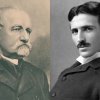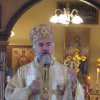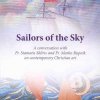Knjiga donosi prevode 13 Zmajevih pesama, kao i Teslin esej pod naslovom “Zmai Ioan Iovanovich the Chief Servian Poet of Today/Zmaj Jovan Jovanović, vodeći srpski pesnik današnjice”, a naš naučnik je to publikovao u periodu od 1894. do 1897. godine, u njujorškom časopisu za kulturu “The Century Magazine”, naveo je jedan od autora knjige Vladimir Todorović.
U ovom poduhvatu je Tesli pomoć pružilo nekadašnje značajno ime američkog pesništva, docnije i diplomatije, Robert Andervud Džonson. Naime, Džonson je Tesline prevode Zmajevih stihova uveo u formu stiha, s tim da ih je uvrstio i u malu antologiju pesama, zajedno sa izborom savremene poezije Grčke, Poljske, Italije i Irske.
Priloge za knjigu napisali su i akademik Matija Bećković i predsednik Matice srpske profesor dr Dragan Stanić, koji je potpisan pesničkim pseudonimom Ivan Negrišorac, a korišćen je i tekst našeg pokojnog profesora na Univerzitetu Severna Karolina dr Vase D. Mihailovića.
Knjigu “Zagrljaj Tesla i Zmaj/An Embrace Tesla and Zmaj” je objavila Izdavačka kuća “Tiski cvet” iz Novog Sada.
Nikola Tesla i Jovan Jovanović Zmaj susreli su se prilikom jedine Tesline posete Beogradu, 2. jula 1892. godine, kada je vozom, preko Novog Sada, došao u Srbiju, a u Beogradu je tom prilikom organizovan svečani doček.
Rečima dobrodošlice i sa velikim oduševljenjem Teslu je dočekao srpski kralj, mnogi znameniti ljudi tog vremena i brojni građani koji su došli da pozdrave čuvenog genija, a jedan od govornika na toj svečanosti bio je niko drugi do omiljeni pesnik Teslin, Jovan Jovanović Zmaj.
On je naučnika pozdravio stihovima, što je ujedno bio i jedini put da Zmaj javno čita svoje pesme. Tesla, iskreno dirnut ovim susretom, prišao je pesniku i poljubio mu ruku i rekao:
“Kad mi je bilo najteže u Americi i kada sam bio od svih odbačen i neshvaćen, s gorkim suzama sam čitao Vašu poeziju, a sada Vam obećavam da ću Vaše stihove prevesti na engleski jezik i u Americi objaviti”.
Po povratku u Ameriku, Tesla se sa strašću bacio na prevođenje Zmajevih pesama i počeo da piše o srpskoj istoriji. Tako je nastao i Teslin esej iz 1897. godine o gorkoj sudbini srpskog naroda, u kome Tesla koristi i Zmajeve stihove i misli zajedno sa svojim interpretacijama kosovske i pokosovske tragedije srpskog naroda.
Teslini prevodi pesama objavljeni su u čuvenom američkom časopisu „Vek” (The Century Magazine). U istom je magazinu izašao i Teslin tekst posvećen Jovanu Jovanoviću Zmaju, u kome je Tesla američkim čitaocima doneo detaljnu biografiju velikog pesnika i otkrio do tada neke nepoznate detalje koji se tiču početaka Zmajevog književnog rada.
Zahvaljujući Nikoli Tesli, Zmaj je postao prvi srpski književnik koji je preveden i objavljen u SAD.
Zmajeva pesma posvećena susretu sa Nikolom Teslom:
Ne znam šta je, je l suština,
Il to čini samo miso-
Čim smo čuli: dolaziš nam,
Odmah si nas elektrisao.
Na sto žice sprovodnice,
Elektrika juri sirom,
vazduhom će biti spoja
(posle možda i etirom)
-Stoji stablo, stoji Srpstvo,
Majka svakom listu-sinu,
Najsvežiji list mu trepnu
pa odleti u daljinu.
Ti nam, Tesla, ti vrlice,
Ode letom jače struje
U daleku Kolumbiju,
da ti munje kolumbuje.
I ti, Tesla, u kojem se
Ispolinske misli roje,
Tebe vraća neodolje,
Da poljubiš stablo svoje.
Ljubi stablo, dojčine mu,
Sisni dojku, sisni vrli.
Svaka grana srpskog stabla
Tesli tepa, Teslu grli.
Beograd je danas sretan
Rukujuć`se s srpskom dikom
I otkriva srce svoje
Pred Srbinom velebnikom.
No ti moraš opet natrag
-Sastanak nam kratko traje-
Al`toplotu nosi sobom
Bratinskog zagrljaja.
Ostvarena jmiso tvoja
Miso divna i golema:
Među nam biće veza,
A daljina nema, nema.
Razumeće listak svezi
Svaku žilu svoga stabla,
(Elektrika nasih srca)
I bez žica i bez kabla.
Izvor: Serbian Times






